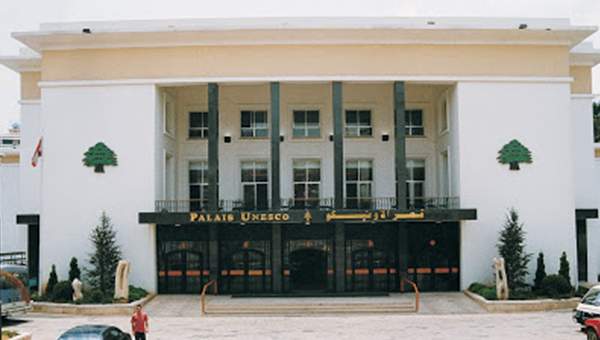Historical Overview
After the independence of Lebanon in 1943, the UNESCO Palace was inaugurated in 1948 to host the 3rd. international congress of the UNESCO. The convention which was described at the time as the first appearance for the young republic of Lebanon on the international arena. Since then, the palace became a central place to host national and international activities.
In 1982, when Israel invaded Lebanon, this cultural center was the target of shelling resulted in the destruction of its theater and equipment. It was renovated and reopened in March 1998 on the 50th. Anniversary of the first UNESCO congress held in the East.
Role and Objectives
The palace's halls and theater host conferences, meetings, lectures, exhibitions and celebrations in all different educational, scientific, cultural and art fields at national and international levels (around thousand events each year).
The interior of the Palace
Ground floor:
- A big theater that accommodates 1200 seats
- Two eastern and western halls
The first floor:
- Upper floor seats of the theater in addition to offices.
- A Cafeteria that can accommodate 300 persons (seated).
The second floor:
- Two meeting rooms equipped with sound and lighting systems that can accommodate 100 persons each.
- Offices
The exterior of the palace
- Three main access (entrance on the east side, exit on the west side, pedestrian access on the north side through the Ministry of Education)
- A free parking area for 150 cars
- garden and water fountain
- Courtyard with benches
Mission and Role of the palace
The UNESCO Palace is administered by the Directorate of National Cooperation and Coordination.
Article 22 of the Regulatory Decree No. 2014/622 states that the UNESCO Palace tasks is to:
• Issue an opinion if the activities and events organized at the Palace are in conformity with the objectives and the priorities of the palace
• Supervise the organization of conferences and educational, scientific and artistic activities and celebrations and cultural festivals under the applicable laws and regulations.
• Cooperate with the events organizers and participate in their preparatory meetings
• Organize the calendar for the use of the palace’s halls according to priorities.
• Ensure that the halls, equipment and crew are ready to host activities.
• Present proposals and studies related to the purchase and the maintenance of equipment as well as to the palace maintenance and cleaning.
• Apply the operating system of the UNESCO Palace in accordance with applicable regulations.
Granting authorization to events:
- To organize an event at the palace, a prior authorization granted by the Minister of Culture or the General Director of Cultural Affairs or the Director of National Cooperation and Coordination must be obtained. It is strictly forbidden to use the halls and the theater of the palace without obtaining such authorization
- The organization of events in the theater and palace halls is free, in absence of a law stipulating the investment of the Palace.
- Preference to the use of halls and theater is given respectively to international conferences, events of the public bodies and local organizers events. Therefore, the direction of the palace is able to change the schedule of events.
To obtain an authorization, the applicant must:
- Present a request by filling out a form, submit an official letter from the organizer to the direction of the palace responsible of issuing an opinion about it. This opinion will be submitted to the General Director to take the appropriate decision,
- Mention in the application form the idea and the type of the activity, the profile of its organizers, the required room, the proposed date, the names of speakers in the case of conferences or other similar events.
- Any association or other legal entity must attach a copy of its “creation Notice".
- Organizers must respect the text of the authorization and the period specified for the halls use. Once the reservation date is postponed, the reservation will be canceled.
- Each organizer has the right to organize an event each year or maximum two events if the direction of the palace deems necessary
- The organizers must follow the guidelines and instructions issued by the direction of the palace.









